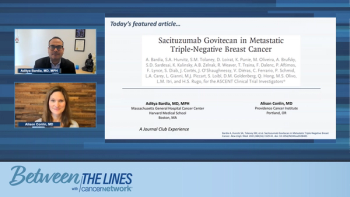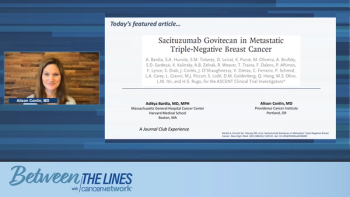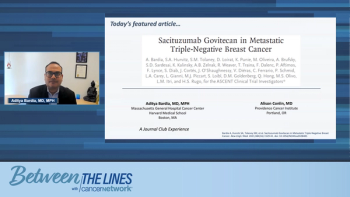
Aditya Bardia, MD, MPH
Articles by Aditya Bardia, MD, MPH



TPS 28 ELEGANT: Elacestrant VS Standard Endocrine Therapy in Women and Men With Node-Positive, Estrogen Receptor-Positive, HER2-Negative, Early Breast Cancer With High Risk of Recurrence in a Global, Multicenter, Randomized, Open-Label Phase 3 Study

Hear from leading cancer experts about the lasting impact the COVID-19 pandemic has left on clinical practice.

Findings from DESTINY-Breast06 showed a PFS of 13.2 months for patients given T-DXd for HER2-low or ultralow breast cancer.

Aditya Bardia, MD, MPH, FASCO, spoke about how the FDA approval of T-DXd in HER2-low or ultralow breast cancer will allow for a broader treatment range.

Regardless of disease burden or disease progression speed on front-line therapy, trastuzumab deruxtecan appears effective in HER2-low breast cancer.


11 Phase 3 Study of Neoadjuvant Pembrolizumab or Placebo Plus Chemotherapy, Followed by Adjuvant Pembrolizumab or Placebo Plus Endocrine Therapy for Early-Stage High-Risk ER+/HER2– Breast Cancer: KEYNOTE-756


16 Open-Label, Randomized, Multicenter, Phase 3, ELAINE 3 Study of the Efficacy and Safety of Lasofoxifene Plus Abemaciclib for Treating ER+/HER2–, Locally Advanced or Metastatic Breast Cancer With an ESR1 Mutation


21 Ribociclib (RIB) + Nonsteroidal Aromatase Inhibitor (NSAI) as Adjuvant Treatment in Patients (pts) With HR+/HER2– Early Breast Cancer (EBC): Final Invasive Disease-Free Survival (iDFS) Analysis From the NATALEE Trial


30 Datopotamab Deruxtecan (Dato-DXd) vs Chemotherapy in Previously-Treated Inoperable or Metastatic Hormone Receptor–Positive, HER2-Negative (HR+/HER2–) Breast Cancer (BC): Primary Results From the Randomised Phase 3 TROPION-Breast01 Trial












Expert oncologists highlight remaining unmet needs in the setting of metastatic triple-negative breast cancer and look toward future evolutions in care.

Centering discussion on sacituzumab govitecan use in metastatic triple-negative breast cancer, expert oncologists reflect on results from the phase 3 ASCENT study.

Centering discussion on sacituzumab govitecan use in metastatic triple-negative breast cancer, expert oncologists reflect on results from the phase 3 ASCENT study.

Key opinion leaders Aditya Bardia, MD, MPH, and Alison Conlin, MD, provide a broad view of the current metastatic triple-negative breast cancer treatment landscape.
Latest Updated Articles
 Clinical Trial Data on Use of ctDNA Assays
Clinical Trial Data on Use of ctDNA AssaysPublished: August 10th 2022 | Updated:
 Impact of ctDNA on the Management of Breast Cancer
Impact of ctDNA on the Management of Breast CancerPublished: August 18th 2022 | Updated:
 Recap Evolving HER2+ Metastatic Breast Cancer Landscape
Recap Evolving HER2+ Metastatic Breast Cancer LandscapePublished: December 31st 2021 | Updated:
 Oncologists Reflect on Pandemic's Lasting Impact on Cancer Care
Oncologists Reflect on Pandemic's Lasting Impact on Cancer CarePublished: March 10th 2025 | Updated:
 Nuancing the Benefit of Circulating Tumor DNA
Nuancing the Benefit of Circulating Tumor DNAPublished: August 10th 2022 | Updated:
 23 Clinical Outcomes in Patients With HR+/HER2− Early Breast Cancer By Prior Systemic Treatment: A Subgroup Analysis of the NATALEE Trial
23 Clinical Outcomes in Patients With HR+/HER2− Early Breast Cancer By Prior Systemic Treatment: A Subgroup Analysis of the NATALEE TrialPublished: June 23rd 2025 | Updated:


